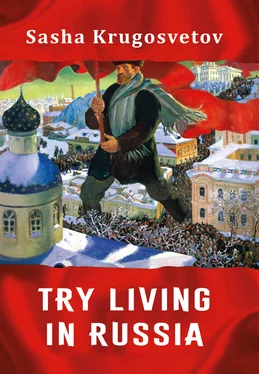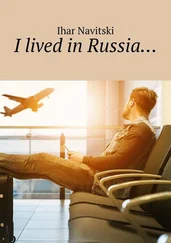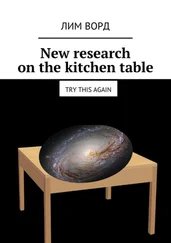Sasha Krugosvetov - Try living in Russia
Здесь есть возможность читать онлайн «Sasha Krugosvetov - Try living in Russia» — ознакомительный отрывок электронной книги совершенно бесплатно, а после прочтения отрывка купить полную версию. В некоторых случаях можно слушать аудио, скачать через торрент в формате fb2 и присутствует краткое содержание. Город: Moscow, Год выпуска: 2020, ISBN: 2020, Жанр: russian_contemporary, на английском языке. Описание произведения, (предисловие) а так же отзывы посетителей доступны на портале библиотеки ЛибКат.
- Название:Try living in Russia
- Автор:
- Жанр:
- Год:2020
- Город:Moscow
- ISBN:978-5-00153-035-0
- Рейтинг книги:3 / 5. Голосов: 1
-
Избранное:Добавить в избранное
- Отзывы:
-
Ваша оценка:
- 60
- 1
- 2
- 3
- 4
- 5
Try living in Russia: краткое содержание, описание и аннотация
Предлагаем к чтению аннотацию, описание, краткое содержание или предисловие (зависит от того, что написал сам автор книги «Try living in Russia»). Если вы не нашли необходимую информацию о книге — напишите в комментариях, мы постараемся отыскать её.
Try living in Russia — читать онлайн ознакомительный отрывок
Ниже представлен текст книги, разбитый по страницам. Система сохранения места последней прочитанной страницы, позволяет с удобством читать онлайн бесплатно книгу «Try living in Russia», без необходимости каждый раз заново искать на чём Вы остановились. Поставьте закладку, и сможете в любой момент перейти на страницу, на которой закончили чтение.
Интервал:
Закладка:
However, the good times didn't last long in the old communal flat on Nevsky Prospekt. The problem was that my grandfather had been repeatedly put through the «steam room» when he was on the Solovetsky Islands. Narrow benches were placed into a small room and the prisoners were made to sit astride these benches, very close together, belly to back. Then they'd fill the room with steam. To make the prisoners suffer. To make them realise that they had to surrender what they had unrighteously amassed to the country of the working people. My grandfather returned from the Solovetsky Islands suffering from severe asthma. He died shortly afterwards.
My mother was the next candidate for marriage. We've kept a portrait of hers, drawn in red sangina pencil by an unnamed suitor who had made, as they say, a spectacular career. In the family album there is the portrait of an elegant man with a violin, who apparently had also shown interest in my dear mother before she got married. But for some reason she married my father. He was of very modest means, not very educated, not at all handsome and eight years her senior. Perhaps my mother, wise even in her youth and frightened by the unpredictable turns and harsh reality of the dictatorship of the proletariat, consciously chose a successful and, in those years, fairly influential Soviet riser-through-the-ranks. Or perhaps she had discerned his generous nature, the strength and courage of his character, and his particular masculine type. It's hard for me to tell. The photographs from this time, taken when I wasn't yet born, during my parents' holidays in the Crimea, in the Caucasus, among the snowdrifts of Khibinogorsk where my father was sent on party orders, show an absolutely happy couple. Against the backdrop of glittering snow my father, torso naked, pushes his treasure in a huge wheelbarrow – my mother, clad in a thin crepe-de-chine dress. Life was smiling at them. This was a couple, a family, a union of two complex individuals who faced a very difficult fate. Their relationship, open, kind, selfless and devoted during happy moments as well as life's harsh trials, has been and will remain to me the exemplary, ideal relationship between a man and a woman.
The Northern Caucasus
The Soviet regime provided many people with the opportunity to receive a previously inaccessible higher education. Samuil graduated from medical school in the 1920s and left his native Rostov-on-the-Don on an assignment to the Northern Caucasus. He worked in hospitals and sanatoriums in Sernovodsk, Zheleznovodsk, and Piatigorsk. The clan from Rostov dreamt that the boy might finally settle down and marry a nice Jewish girl. Samuil had his own ideas regarding life. Medicine came first. Medicine was his calling. Behind the plain exterior there was a strong, resolute character. He was a good doctor, organised, knowledgeable and capable of holding his own when it came to treating a patient. He had instinct and intuition. And, most importantly, he loved his patients. That's why he could intuit what they felt. That's why he became a good doctor. And an excellent administrator. He was head of several sanatoriums, one after the other. With regard to having a Jewish wife – no, please don't start. I know what these wives are like. They sleep until midday, and around 2pm they utter the first words: «Syoma, everything hurts!» Samuil loved Tonya Fedotova, who came from an educated, well-to-do intelligentsia family. Every conceivable ethnicity was mixed into this family: there were Russian roots, Terek Cossack influence, Georgian blood and possibly a drop of Turkish blood, too. Tonya was the younger of two sisters. She was not as beautiful as the elder sister, Tanya. But my god, what a woman she was. Delicate and feminine. Slim, well-proportioned, with the Madonna's sad face. Just like Vera Kholodnaya. She played the piano and sang in a quiet voice, kept a diary and wrote poetry. Syoma knew exactly what he needed from life. How could he not have fallen in love with Antonina? If there is a young man among the readers of this sketch, listen to your older comrade. If you happen to meet a woman with a quiet voice who is not talkative and modestly averts her pensive eyes, concealed behind long lashes, don't dismiss her, don't walk past this rare stroke of luck. The strongest, most faithful, selfless and fervent female natures are hiding behind such lowly beauty, such quiet charm. It is them who bestow upon their chosen one the most passionate embraces and become his faithful support for life.
Samuil and Tonya got married. Tonya bore two sons, Vova and Misha, two years apart in age. The chief doctor was a well-respected man. His family received a flat with three rooms. Samuil gave one room to a woman without a family, a fellow doctor at his sanatorium. He had decided that two rooms were enough for his family. Antonina was very hospitable. The doors were always half open. The house was furnished with ascetic simplicity: hospital bunks, a wardrobe, table and chairs. No other furniture whatsoever. In their place a piano, a splendid library and many guests. Antonina, slow by nature, would get up at six in the morning, run to the market, then cook. She managed to feed everybody. Anyone could turn to her family and ask for help. Some insolent women came regularly, asking for money. And Antonina would slip them something. When she had no money, she would give them food, milk, eggs, everything she had. She was incapable of turning anybody away. Acquaintances and others who had come to the resort but didn't know her well would stay at the house. Everybody, apart from Samuil's relations. They couldn't forgive his choice of a wife. They still refused to recognise Antonina and her children. The children hardly knew their father's relatives. However, all their life the children entertained a very close relationship with the beautiful Tanya, Auntie Tanya. I'll charge ahead and tell you that Misha told Tanya things he wouldn't have told his own mother.
The boys were taught music and drawing. They were very capable children. Their school grades were excellent, and both had a gift for the exact sciences. The elder, Volodya, played the violin. He was a fine draftsman, able to create with a single stroke, a single line, the image of a person or outline a landscape. The younger brother, Mishka, played the piano. However, the boys weren't mollycoddled or kept indoors. Let's remember the atmosphere of a warm, southern resort town – the atmosphere of perennial feast. A host of holidaymakers, visitors from the large cities. An abundance of fruit. And an abundance of temptations. Just as all other local children, the boys ran wild in the street, made friends with the people from Caucasus, went to the mountains, climbed trees and collected mulberries. They grew up real tomboys. Once they were chasing each other and Vova slammed the door in Misha's face, bam! Now his brother had a huge conk where his nose was meant to be. And so Misha went through life with a broken, squashed nose. Another time Misha was running after Vova, threatening him with a hot iron, and when he caught up with him he pressed the iron against his bottom, and so Vova was left with the imprint of the iron for life. Antonina decided to get an education and enrolled at the Medical Institute. On the very first day of her course her neighbours told her in the evening that they had seen her dear boys walk along the cornice of the fifth floor. There could be no talk of lectures or study. Oh, it seems that Tonya's dreams of a degree, her dreams to raise her boys to become musicians, writers, artists or doctors, were all in vain. These dreams weren't meant to come true. The younger, Misha, turned out particularly sprightly. He was lively, always laughing and very kind, and as a result everybody loved him, his peers as well as the adults. And whether through constant exposure to the sun or by nature, he was not just sun-bronzed, but downright black. Black like some Indians. Mishka-the-Black, his friends would call him. And that nickname stayed with him to the end of his life. Misha loved to play billiard. He reckoned that he had to know how to do all things better than the others. Sometimes, professional billiard players would come to the sanatorium. One of them became the boy's patron and trained him rather well. Before the outbreak of the war the short ten-year old boy was a very decent player already. Whenever someone came who wanted to play for money, some new artist on tour, Misha's billiard mentor would deploy his favourite trick. Not so quick, he would say. Why don't you first play the lad over there. People would quickly gather for their favourite spectacle. The «lad» would clamber onto a chair, as he couldn't reach the balls standing on the floor. And then he would tear the guest artist to shreds, to everyone's amusement. Yes, it didn't look as if Misha would become a pianist or writer. The country was troubled. Sometimes there was trouble in this god-protected house, too. The terrible year 1937 began to ramble and roar and then exploded in claps of thunder. «Oh how I want to fly away, unseen by anyone, fly off after a ray of light and not exist at all», wrote Mandel'shtam. We won't manage to fly away, Osip Emil'evich, we won't manage to hide or turn into an invisible ray. The local NKVD was given an order; they had to uncover and arrest several thousand hidden enemies of the people. A number of them were to be executed, the other part to be sent to the GULAG. Committees of three NKVD-members were formed, arrests prepared. Lists were compiled of Trotskyites, anti-party groups, kulaks, accomplices of the White Army, spies, war specialists involved in subversive acts, saboteurs, other alien elements. Let's have a heart-to-heart with them, they will confirm everything. Sernovodsk is a small town, everybody knew at whose house the black police car would call next during the night. In the chief doctor's house they were expecting visitors, too. The family was saved by the Chechens. They loved Samuil and decided to help. Old men in burkas came and sat down in the sanatorium's courtyard. «Samuil, don't go home. Stay here for a bit. We've told your family. They won't worry. We'll see what happens.» Every child in town knew about the Chechens in the sanatorium. For the NKVD this was an unexpected turn. There could be unforeseen disturbances. They'd get a rap on the knuckles in Moscow for this. To hell with that Samuil. May he live and work for the good of the proletarian state. He's a good doctor, isn't her? Well, let him work then. We'll manage without including him in our report. Perhaps it really happened like that. Perhaps the Chechens simply hid the chief doctor, his wife and children for a while. Whatever happened, the storm passed by Samuil and his family. But for how long? Hard to predict how the events would have unfolded further. A huge, cruel, merciless war appeared at the threshold, a war that jumbled everyone and everything and destroyed all plans to build a «peaceful» life in the land of the Soviets. During the war, a torrent of casualties flooded from the frontline into the North Caucasus. The sanatorium was transformed into a war hospital. Samuil, the sanatorium's chief doctor, became head of the hospital. His non-proletarian origin didn't stand in the way of his appointment.
Читать дальшеИнтервал:
Закладка:
Похожие книги на «Try living in Russia»
Представляем Вашему вниманию похожие книги на «Try living in Russia» списком для выбора. Мы отобрали схожую по названию и смыслу литературу в надежде предоставить читателям больше вариантов отыскать новые, интересные, ещё непрочитанные произведения.
Обсуждение, отзывы о книге «Try living in Russia» и просто собственные мнения читателей. Оставьте ваши комментарии, напишите, что Вы думаете о произведении, его смысле или главных героях. Укажите что конкретно понравилось, а что нет, и почему Вы так считаете.












